Are you a speech therapist or parent looking for medial k words to practice with your child or student? This blog is just what you need when working on the pronunciation and articulation of medial K words! Medial K words are those that have the K sound in the middle, such as “making” or “jacket.” This post has over 85 medial k words for speech therapy that will help strengthen your child or student’s /k/ sound, which can impact their overall communication skills.
We as speech therapists possess the necessary expertise to assess, diagnose, and treat articulation difficulties related to medial K words.
If you are a parent it is important to seek out professional support from a speech-language pathologist who knows various techniques and strategies to help individuals improve their pronunciation of these words and, ultimately, their overall speech and language abilities.
Later on in this article we will be providing additional resources available to support individuals and their caregivers in the process of mastering the correct articulation of medial K words.
Medial K Words Speech Therapy
When I was as a speech-language pathologist in the schools, I was always on the lookout for speech therapy articulation lists.
Key Takeaways
- Medial K words are crucial for clear and effective communication.
- Speech therapists use a variety of techniques to help individuals articulate medial K words accurately.
- There are additional resources listed in this post that can be used as helpful resources when working on the medial K sound in speech therapy.

Understanding Medial K Words
In speech therapy, we often work with clients who struggle to produce certain speech sounds in different positions within words. One common challenge is the production of the medial K sound, that is, when the K sound appears in the middle of a word. Medial K words include examples such as “baker”, “basketball”, and “socket”.
Word Positions: Medial K Words Speech Therapy
Initial Position of Words
The initial position of the k sound is at the beginning of a word. For example, initial sounds such as “kite” or “cat”.
Medial Position of Words
Some words have the k sound in the medial position of a word, such as “bacon”, “rocket”, and “taco”.
Final Positions of Words
The final positions of words are when the target sound is at the end of a word. For example, “bake” or “took”.
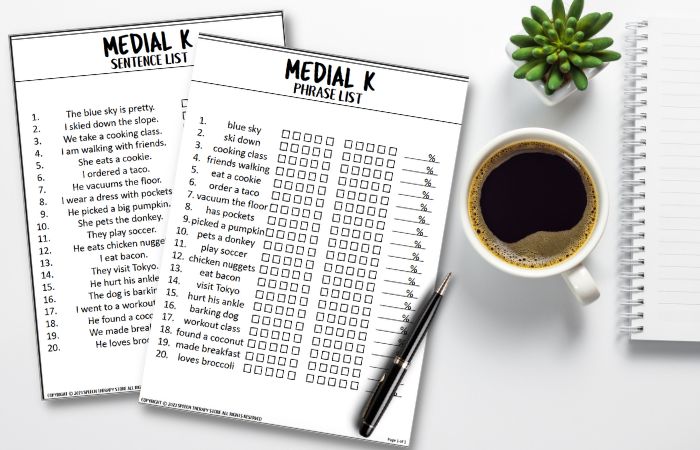
Evaluating and Creating Articulation Goals
When working with a client in speech therapy, it’s essential first to identify and evaluate the speech sound disorders they are experiencing, and then develop an appropriate therapy plan to address the specific issues. Articulation disorders are characterized by difficulty producing speech sounds in words, phrases, or sentences.
Tongue Position
To target the medial K sound in therapy, we start by building the client’s awareness of how the sound is produced. The medial k sound is one of many back of the mouth sounds. This involves understanding the proper tongue placement and airflow needed to produce the K sound.
- When working on the medial k sound, a velar consonant, the first thing you want to do is pull your tongue to the back of the mouth and place it against the soft palate (the top of your mouth).
- Once your tongue is in position then push air through your mouth while lowering the tongue towards the front of the mouth.
TIP: If your child or student is struggling to place their tongue in the correct position you can use a tongue depressor to provide your child’s tongue with a tactile cue.
Once the client has a general understanding of the medial K sound, we can begin incorporating these words into various therapy activities to encourage correct pronunciation.
It’s important to remember that progress can be gradual and varies from one client to another. Consistent practice and exposure to activities addressing medial K words will ultimately help clients improve their articulation and enhance their overall communication skills.
Age Mastered
By 2 years of age children will begin making the k sound and by the age of 3 years old the child will have mastered the sound according to the GFTA-2 Standardized sample.
If your child is struggling or making slow progress to produce the k sound, the first thing you’ll want to do is get testing done by a speech therapist.
Phonological Process
A phonological disorder is when a child’s speech makes multiple similar sound errors, such as velar fronting of the T sound for the K sound.
Velar Fronting T for K
When your child or student substitutes the k sound for the t sound this is called velar fronting and they are taking back sounds for the same sound that is made in the front of the mouth.
An example of this would be saying the word “tight” instead of the word “kite”.
A great way to work on velar fronting of the k sound would be to work on minimal pair words. You could do this by having your child or student have the words “tight” and “kite” side by side with a picture and then having your student practice saying each word and listening for the slight difference.
Be sure to consult with a certified Speech Pathologist if your child is experiencing a phonological speech disorder.

Target Words
I’ve provided a full list of words below that are suitable for 1st grade and above and that include the medial K sound in various positions within the word. During articulation practice, we pay special attention to the placement of the tongue at the back of the mouth, ensuring that the sound is produced correctly.
Here’s a list of medial k articulation words for you to use in therapy or at home practice to work on your student or child’s new skill.
- For Example: backpack, pickle, jacket, raincoat, pumpkin, helicopter
See full list of words, phrases, and sentences below.
Be sure to grab my one page free resource for medial k sounds below. Simply scroll to the bottom of this post from Speech Therapy Store and grab your free copy!

Medial Words at Word Level
Some ways to practice include having your child or student say each medial /k/ word one by one as they go through a list.
Using a dot marker can also be a fun way to practice having your child put a dot under each medial k sound.
In addition, I’ve compiled an easy-to-download one page overview of medial k sounds below. Simply scroll down to the bottom of this post and download your free copy.
- 1 Syllable: sky, ski, baked, jokes
- 2 Syllable: Jackson, milking, working, cooking, walking, breakfast, weekend, baker, workout, workers, maker, smoking, barking, ankle, looking, booking, token, joker, trickster, poker, cookout, checklist, banking, talking, taken, ticking, seeking, package, sparkling, choking, soaking, blackmail, weekday, sulking, bleakness, crackling, peckish, checkmate, Tokyo, duckling, braking, quicksand, picking, masking, cheekbone, cakey, lurking, workday, rocking, thickness, parking, blackbird, bucket, biking, bacon, chicken, soccer, sucker, donkey, uncle, napkin, jacket, pocket, pumpkin, vacuum, taco, raincoat, bobcat, bookmark, cracker, cookie
- 3 Syllable: hickory, vacation, apricot, Africa, awaken, broccoli, chocolate, coconut, pelican, cucumber
Practice in Flash Card Mode Right Here from Your Computer!
Medial K Words Speech Therapy
| 1 Syllable | 2 Syllable | 3 Syllable |
|---|---|---|
| sky | Jackson | hickory |
| ski | milking | vacation |
| baked | working | apricot |
| jokes | cooking | Africa |
| walking | awaken | |
| breakfast | broccoli | |
| weekend | chocolate | |
| baker | coconut | |
| workout | pelican | |
| workers | cucumber | |
| maker | ||
| smoking | ||
| barking | ||
| ankle | ||
| looking | ||
| booking | ||
| token | ||
| joker | ||
| trickster | ||
| poker | ||
| cookout | ||
| checklist | ||
| banking | ||
| talking | ||
| taken | ||
| ticking | ||
| seeking | ||
| package | ||
| sparkling | ||
| choking | ||
| soaking | ||
| blackmail | ||
| weekday | ||
| sulking | ||
| bleakness | ||
| crackling | ||
| peckish | ||
| checkmate | ||
| Tokyo | ||
| ducking | ||
| barking | ||
| quicksand | ||
| picking | ||
| masking | ||
| cheekbone | ||
| cakey | ||
| lurking | ||
| workday | ||
| rocking | ||
| thickness | ||
| parking | ||
| blackbird | ||
| bucket | ||
| biking | ||
| bacon | ||
| chicken | ||
| soccer | ||
| sucker | ||
| donkey | ||
| uncle | ||
| napkin | ||
| jacket | ||
| pumpkin | ||
| vacuum | ||
| taco | ||
| raincoat | ||
| bobcat | ||
| bookmark | ||
| cracker | ||
| cookie |
SEE ALSO: 21 Best Reinforcement Games for Speech Therapy
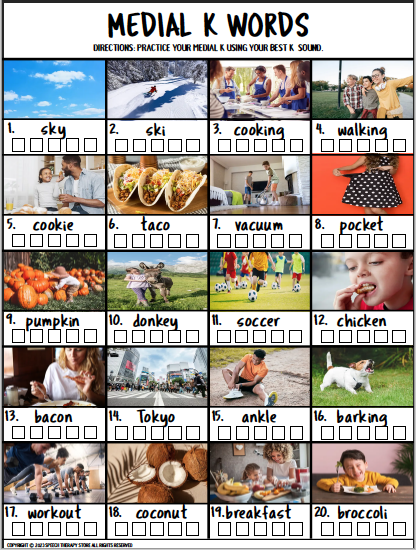
Short Sentences or Phrases
When working on medial k sound production, it’s important to work on short phrases once your child or student has mastered the sound at the word level at or near 80% or higher accuracy.
Here is a list of medial k word phrases to try:
Medial K Words Speech Therapy in Phrases
| 1 Syllable | 2 Syllable | 3 Syllable |
|---|---|---|
| blue sky | Jackson waved | hickory tree |
| ski slope | milking the cow | go on vacation |
| baked the brownies | working out | apricot tree |
| tells jokes | cooking class | visit Africa |
| walking with friends | awaken early | |
| make breakfast | loves broccoli | |
| weekend trip | chocolate candy | |
| is a baker | coconut tree | |
| workout class | pelican flies | |
| hard workers | cuts a cucumber | |
| bread maker | ||
| smoking the bbq | ||
| barking dog | ||
| hurt ankle | ||
| looking for birds | ||
| booking an appointment | ||
| arcade token | ||
| is a joker | ||
| is a trickster | ||
| poker face | ||
| host a cookout | ||
| makes a checklist | ||
| banking on winning | ||
| talking quickly | ||
| spot is taken | ||
| ticking clock | ||
| seeking help | ||
| package is delivered | ||
| sparkling lights | ||
| is choking | ||
| soaking wet | ||
| blackmail is bad | ||
| weekday plans | ||
| sulking in the corner | ||
| feels bleakness | ||
| crackling fire | ||
| peckish beak | ||
| checkmate in chess | ||
| visit Tokyo | ||
| ducking under the roof | ||
| car is braking | ||
| quicksand is over there | ||
| picking apples | ||
| masking her feelings | ||
| puts blush on her cheekbone | ||
| cakey texture | ||
| lurking under the deck | ||
| is a workday | ||
| rocking the baby | ||
| coat has thickness | ||
| parking lot | ||
| blackbird flies | ||
| bucket of water | ||
| biking down the road | ||
| eat bacon | ||
| chicken nuggets | ||
| play soccer | ||
| asks for a sucker | ||
| pet donkey | ||
| uncle is funny | ||
| ask for a napkin | ||
| red jacket | ||
| has a pocket | ||
| big pumpkin | ||
| vacuum the floor | ||
| eat a taco | ||
| yellow raincoat | ||
| bobcat hides | ||
| lost her bookmark | ||
| cracker and cheese | ||
| eats a cookie |
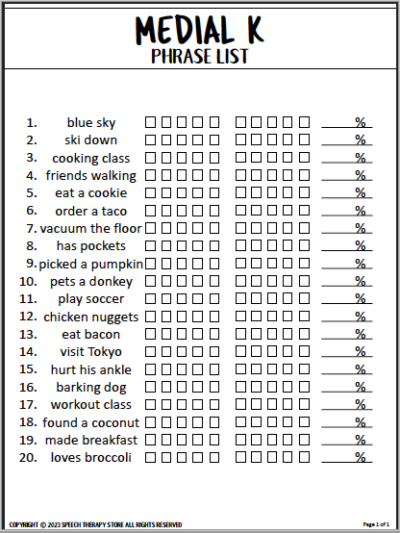
Sentence Level: Medial K Words Speech Therapy
The next step after working at the word and phrase levels is to work on the medial k sound at the sentence level.
There are different ways to practice at the sentence level. For example, you could give your child or student a list of sentences to read aloud while they work on their medial k sound.
Another idea would be to give your child or student pictures with their medial k sound in them and then have them create a sentence about those pictures.
Below is a list of sentences to use with your child or students.
Medial K Words Speech Therapy in Sentences
| 1 Syllable | 2 Syllable | 3 Syllable |
|---|---|---|
| The blue sky is pretty. | Jackson waved at his mom. | I sat by a hickory tree. |
| I ski down the slope. | The farmer is milking the cow. | We went on vacation. |
| We baked the brownies. | I am working out. | I planted an apricot tree. |
| He tells jokes. | We went to a cooking class. | We plan a visit to Africa. |
| He is walking with friends. | I will awaken early. | |
| We made breakfast. | She loves broccoli. | |
| I went on a weekend trip. | I ate a chocolate candy. | |
| She is a baker. | I see a coconut tree. | |
| I took a workout class. | The pelican flies above the water. | |
| They are hard workers. | He cuts a cucumber. | |
| I use a bread maker. | ||
| We are smoking the BBQ brisket. | ||
| The barking dog is at the fence. | ||
| He hurt his ankle. | ||
| I am looking for birds. | ||
| She is booking an appointment. | ||
| I have an arcade token. | ||
| He is a joker. | ||
| She is a trickster. | ||
| He wears a poker face. | ||
| We hosted a cookout. | ||
| She makes a checklist. | ||
| We are banking on winning. | ||
| She is talking quickly. | ||
| That spot is taken. | ||
| The ticking clock is loud. | ||
| He is seeking help. | ||
| My package was delivered early. | ||
| I love the sparkling lights. | ||
| He is choking. | ||
| I am soaking wet from the rain. | ||
| Blackmail got him in trouble. | ||
| We have weekday plans. | ||
| The cat is sulking in the corner. | ||
| She is feeling bleakness. | ||
| The crackling fire is warm. | ||
| The bird has a peckish beak. | ||
| I got a checkmate in chess. | ||
| We visited Tokyo. | ||
| He is ducking under the roof. | ||
| The car is braking. | ||
| There is quicksand over there. | ||
| We like to go picking apples. | ||
| She is masking her feelings. | ||
| She puts blush on her cheekbone. | ||
| This has a cakey texture. | ||
| The possum is lurking under the deck. | ||
| It is a workday. | ||
| She is rocking the baby. | ||
| This coat has thickness and warmth. | ||
| The parking lot is busy. | ||
| The blackbird flies. | ||
| She carries a bucket of water. | ||
| He is biking down the road. | ||
| I love to eat bacon. | ||
| He eats chicken nuggets for lunch. | ||
| We play soccer. | ||
| The toddler asks for a sucker. | ||
| She has a pet donkey. | ||
| My uncle is funny. | ||
| I asked for a napkin. | ||
| He has a red jacket. | ||
| This dress has a pocket. | ||
| He picks a big pumpkin. | ||
| He vacuums the floor. | ||
| I ate a taco. | ||
| She wears a yellow raincoat. | ||
| The bobcat hides. | ||
| She lost her bookmark. | ||
| I ate a cracker and cheese. | ||
| She ate a cookie. |
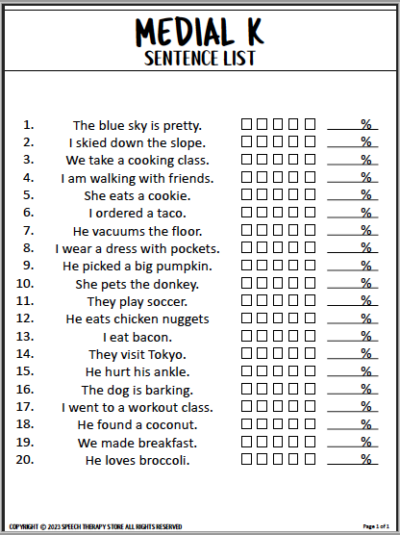
Need Other Sounds?
Here are a few word lists for a specific articulation disorder or simply check out my complete list of articulation words to help get you started!
- Initial k words speech therapy & final k sound
- G Sounds: initial g, medial g, final words g sound
Medial K Words Speech Therapy Ideas
Young Children
As speech therapists, we recognize the importance of working on the medial K sound with young children.
Early intervention is crucial for children’s speech development, and medial K can often present challenges for them.
We can provide a variety of home practice sheets, articulation worksheets, and fun activities that make working on the K sound enjoyable.
- Speech therapy medial /k/ word and phrase level practice sheet by Erin Brown is a simple, print and go activity for younger students. This simple activity prompts students to circle the picture with the target sounds.
- I SPY SPEECH SOUNDS – NO PREP ARTICULATION WORKSHEETS – FREE SAMPLE by Keeping Speech Simple is a highly rated print and go I Spy Activity for younger students!
- K Articulation Cookie Game for Speech Therapy by Speechy Musings is an engaging activity to practice Medial K articulation with young students. Students pick cookies, say the target sound/word and then put it into a cookie jar.
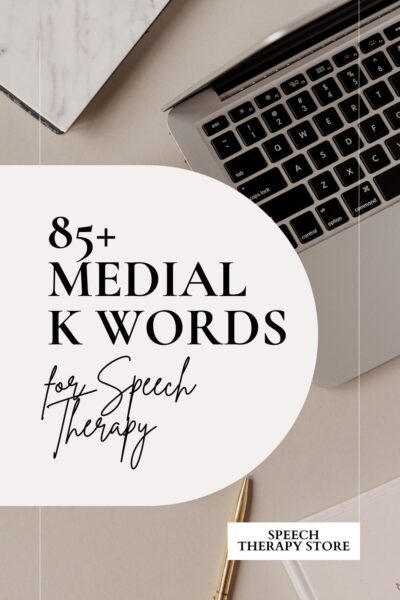
Minimal Pairs
In our speech therapy sessions, we focus on teaching children the correct position and technique to produce the medial K sound.
We utilize target words and minimal pairs during student practice to help differentiate between the similar k sound and t sound.
These techniques assist in the proper formation of medial K sounds at the beginning, middle, and end of a word.
- Articulation Activity Go Fish | T and K Minimal Pairs | Speech Therapy by Speechies and Cream is a set of colorful and engaging cards that target K articulation with minimal pairs!
- /k/ and /t/ minimal pairs in CVC words by Lauren Vasquez is a great printable to target practice K articulation minimal pairs.
- Articulation: Minimal Pairs K and G, T and D, CH and SH by Ms. Gardenia’s Speech Room is a fun and engaging game that targets minimal pairs with multiple sounds including the /k/ sounds. This has a butterfly theme and is highly rated!
Boom Cards
To further facilitate learning, we can utilize interactive resources to engage children in speech therapy sessions. One of our favorite tools is the use of Boom Cards.
These pre-made digital activities provide a fun and engaging way for children to practice their medial K sounds and some even provide real-time student data.
Here are a few favorite boom cards to work on the medial k sounds:
- Free Feed the Shark Medial K Sound Articulation Boom Cards | Speech Therapy by GoldieTalks Speech is a highly rated and engaging game that prompts students to feed the sharks the medial k target words.
- FREE Back to School K Articulation Memory Game Boom Cards™ Speech Therapy by Pinwheel Speech Resources is a fun and engaging interactive memory game with K articulation words in all positions!
Here are two more for initial K:
- Free Feed The Penguin K Sound Boom Cards | Articulation | Speech Therapy by GoldieTalks Speech is a fun game that has students take care of penguins using target k articulation words.
- FREE Carnival K Articulation Boom Card Games for Speech Therapy by Fun in Speech is an engaging game that prompts students to pop balloons at a carnival as they practice medial k articulation.
Games
Another favorite resource is games. Here are some resources that we can incorporate our favorite target words and minimal pairs to provide variety and maintain interest.
- FREE Back to School K Articulation Memory Game Boom Cards™ Speech Therapy by Pinwheel Speech Resources is a fun and engaging interactive memory game with K articulation words in all positions!
- FREE NO PREP: Articulation Video Game Coloring Sheets for Speech Therapy by Speech by Madison is a fun and engaging coloring game that targets Medial K articulation sounds.
- FREE! Early Speech Sounds – Speech Bubble Mats [H, T, D, W, P, B, M, N, G, K] by SpeakEazySLP is an easy to print and go, engaging bubble mat game that students love to play as the practice their K articulation.

Silly Sentences
Using silly sentences for articulation therapy can be a super fun activity.
Here are a few resources you could use or simply come up with your own creative ways to practice your student’s articulation words in silly sentences.
Speech Therapy Worksheets and Materials
In our quest to support speech students with medial K speech therapy, we have discovered various resources that can help streamline the process.
Worksheets and materials play a vital role in providing structured exercises for practicing medial K articulation.
- Camping Speech Therapy Seeking Activities B P K G and more by Speech Dreams is a great activity to print and go that helps your students practice Medial K articulation during independent work.
- Artic Webs: /k/ sample FREEBIE for Speech Therapy by Panda Speech is a highly rated activity with a fall theme that helps students practice K articulation.
- K Medial Sound by Speech SF is an easy to print material with engaging pictures for students practicing medial k articulation.
As experienced speech therapists, we also encourage the incorporation of interactive whiteboards and lesson plans to engage students further.
This provides them with a more visual and hands-on learning experience in mastering the medial K sound.
Multisyllabic Words
If you’re looking for multisyllabic words to practice with your child or student while they work on their medial K sound then be sure to check out my multisyllabic word lists.
SEE ALSO: Free Articulation Games for Speech Therapy

Tips for Parents and Caregivers
As speech therapists, we understand that supporting your child’s speech development at home is essential. In this section, we will provide some useful tips specifically for helping your child with medial K words speech therapy.
Home Practice Tips
To help your child excel in their speech therapy for medial K words, we recommend the following activities and techniques:
- Model the correct position: Demonstrate how to make the K sound by placing the back of your tongue against the roof of your mouth. Encourage your child to imitate you and give them constructive feedback as they practice.
- Sound pictures: Create artwork together that features words containing medial K sounds. This visual representation will help your child associate the sound with its position in words.
- Fun activities: Engage your child in activities that involve medial K words, such as singing songs, reciting nursery rhymes, or storytelling. Reinforce the target sound by emphasizing it during these activities.
- Play games: Introduce a fun game that incorporates medial K words, including board games and online interactive games. Games can make the learning process more entertaining and enjoyable for your child.
Incorporating these home practice tips into your child’s daily routine will help them become more comfortable and accurate with medial K words.
Remember, consistency and patience are key in supporting your child’s speech and language development.
By providing a positive and engaging environment, you can make a significant impact on your child’s progress in speech therapy.
SEE ALSO: 279+ Free Speech Therapy Digital Materials
Conclusion – Medial K Words Speech Therapy
In our journey through medial K words speech therapy, we have explored various techniques and resources that can assist both therapists and individuals in improving the pronunciation of this particular sound.
The wide range of medial K words and therapy activities shared are excellent starting points for building targeted, engaging speech therapy sessions.
Remember that success in speech therapy requires practice, patience, and persistence.
We hope you have found this article helpful for working on your child or student’s medial k sound.
Be sure to grab your freebie of 20 words to start practicing 5 minutes a day!
Grab Your Free Medial K Word List with Pictures Here!
Simply enter your name and email to have this free Medial K Words list with picture cards emailed directly to your inbox!
Frequently Asked Questions
How can I practice medial K words in speech therapy?
To practice medial K words in speech therapy, we suggest creating a list of target words that contain the K sound in the middle position. These words can be used in various activities and exercises, such as repetition drills, reading aloud, and storytelling. Additionally, using medial K word worksheets can be beneficial in targeting specific words and practicing them in a structured manner.
Which activities help improve medial K sounds?
Activities that can help improve medial K sounds include playing games with K words, reading books with a focus on medial K sounds, and incorporating K sound words into daily conversations. K word lists and speech therapy activities are available online, providing ideas and resources to implement in your practice. Remember to keep the activities engaging and fun to keep the child motivated.
What are some examples of medial K word sentences?
Creating sentences with medial K words can significantly improve articulation and understanding of the sound. Examples of medial K word sentences are:
- The donkey carried a heavy sack.
- She accidentally cracked the window.
- The monkey was swinging from branch to branch.
Encourage the use of medial K words in various sentence structures to enhance language proficiency and articulation skills.
How do medial K words differ from initial and final K words?
Medial K words have the K sound in the middle position within the word, such as “locker” or “baking.” Initial K words, on the other hand, have the K sound at the beginning of the word, like “kite” or “car.” Conversely, final K words feature the K sound at the end, such as “book” or “duck.” It’s essential to differentiate between these positions to ensure targeted practice and successful speech therapy outcomes.
What strategies can be used to teach medial K words?
When teaching medial K words, it’s crucial to use a variety of strategies to engage the child and make the learning process enjoyable. These strategies can include:
- Visual aids and cue cards to illustrate proper mouth placement for the K sound.
- Using a mirror to allow the child to see the correct tongue placement.
- Incorporating multisensory approaches, such as tactile and auditory feedback.
- Providing positive reinforcement and encouragement.
Remember that each child is unique, so tailoring strategies to meet their individual needs is vital.
How can I improve articulation of medial K sounds?
Improving articulation of medial K sounds can be achieved through consistent practice and focused exercises. Start by isolating the K sound, practicing it in different word positions, and gradually progressing towards more complex words and sentences. Ensure a strong focus on the medial position and use targeted activities that require the child to articulate medial K sounds correctly. Regular feedback and reinforcement will also contribute to successful articulation improvement.
Want Even More Medial K Words Speech Therapy?
- 21 Best Reinforcement Games for Speech Therapy
- 261+ Free Ideas for Digital Therapy
- 917+ Best Free Boom Cards for Speech Therapy
- 11 Free Articulation Games for Speech Therapy
- Best Free Interactive PDF for Speech Therapy All-in-One
Want the Best of the Bests?
Be sure to check out our most popular posts below!
- 21 Best Reinforcement Games for Speech Therapy / Teletherapy
- Best IEP Resources
- 71+ Free Social Problem-Solving Scenarios
- 430+ Free Multisyllabic Words List Activity Bundle
- 432+ Free Measurable IEP Goals and Objectives Bank
- 279+ Free Speech Therapy Digital Materials
- 179+ Free Speech Therapy Wh-Questions Printable



















































